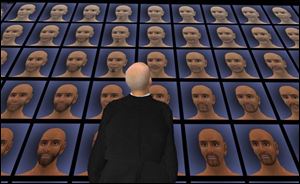
'Molotov Alva' is like looking in a funhouse mirror
5/15/2008
Douglas Gayeton considers faces for his avatar, Molotov Alva.
It's billed as the first documentary film to be shot entirely in virtual reality, and that makes it something special. It also makes it a little weird.
Documentaries, by definition, paint an unvarnished, true portrait of life as it is. But in a virtual world, nothing is what it seems to be, and virtual reality can have very little to do with life as it really is.
If you can handle the underlying contradiction, then you'll probably get a kick out of the newest Cinemax Reel Life special, Molotov Alva and His Search for the Creator: A Second Life Odyssey, which premieres on the premium cable channel at 8 tonight, with a repeat at 7:30
a.m. May 30.
But if your idea of virtual reality is Survivor, The Bachelor, or any muddle-brained series that has Paris Hilton in its cast, then Molotov Alva will probably be as disorienting to you as a fun-house mirror.
To get some kind of handle on the concept behind the 30-minute show, it helps to know that the Second Life referred to in the title is an Internet-based virtual reality "community" with millions of members around the world, about a million of whom are active users. They create digital "avatars," or animated, three-dimensional alter egos to represent themselves in this artificial world.
"Molotov Alva" is the avatar of California filmmaker Douglas Gayeton, the guy behind an animated sci-fi TV series called Delta State and the creator of a video game based on the movie Johnny Mnemonic. Gayeton abandoned what he calls "the carbon-based world" (that's where you and I live) to spend six months immersed in the virtual reality of Second Life.
Gayeton's film introduces viewers to life inside a fantasy world, where members go to escape reality and explore their dreams and, well, fantasies. Such virtual worlds are the answer to some people's need to be someone or something they're not.
While in Second Life, Alva finds he's no more enlightened than Gayeton is in the real world. He's got plenty of freedom but has difficulty forging new relationships and can't find much meaning in anything.
During his cyber-travels he hooks up with another avatar, the pop-eyed Orhalla Zander (apparently avatars are required to have goofy names), who inspires him to seek out the Creator of Second Life.
Like The Karate Kid's Mr. Miyagi, the Creator is presumed to have the answers to life's big questions - or at least life as it's envisioned on a computer screen.
For those who are unfamiliar with MMORPGs (massively multiplayer online role-playing games), Molotov Alva gives an interesting peek into a colorful digital world where pixilated buildings, trees, oceans, and even people can suddenly appear, then just as suddenly morph into something else or disappear altogether.
Beyond that, it's basically 30 minutes of head-scratching.
In an apparent attempt to reflect deep, metaphysical thinking, the documentary is peppered with quotes such as: "The unexamined life is not worth living" - Socrates, and "Reality is merely an illusion, albeit a persistent one" - Albert Einstein.
But for all its didactic pretensions, the film accomplishes little more than highlighting some of the major weaknesses of virtual reality.
Because each person's virtual world is based mainly on what he or she already knows and has experienced in the real world, the fanciful world they create online has built-in limitations.
Also, it turns out that virtually reality is actually a lot more virtual than real. Watch your avatar walking on a beach. It - and consequently, you - can't feel the hot sand churning beneath its feet, or the sunlight on its face, and it can't dip its toes in the water to check how cold it is. Yeah, you're experiencing a beach, but no more so than if you were studying a painting of the Lake Erie coastline in a museum.
In the spirit of Molotov Alva - or maybe Mr. Miyagi - I'll leave you with one last metaphysical thought:
"A 30-minute documentary that revolves mostly around self-conscious naval gazing seems to last a lot, lot longer than 30 minutes."